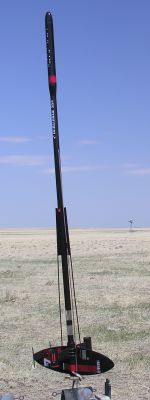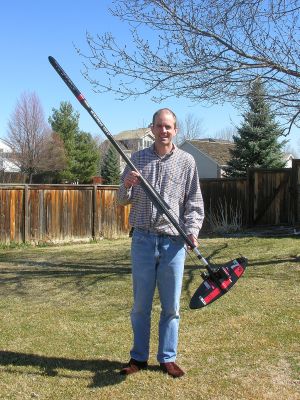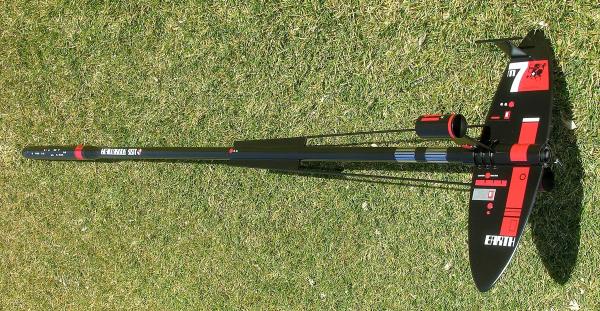| Construction Rating: | starstarstarstarstar_border |
| Flight Rating: | starstarstarstarstar |
| Overall Rating: | starstarstarstarstar |
| Manufacturer: | Qmodeling  |

Brief:
The Qmodeling Retro Mega Series Andromeda is one of the most formidable mid-power kits available. This beautiful kit
is a 1.65:1 upscale of the Estes Andromeda. QModeling's BT-60 version stands nearly 6 feet tall. The 24mm motor mount
is designed for high-thrust APCP motors such as F24-4 or F21-6.
Construction:
There are over 80 parts and also more than 80 construction steps listed in the 30-page manual. The parts are very
high quality, with no scrimping to save money. For example, the numerous ply rings, two hard composite assembly jigs,
nylon parachute, Nomex®
chute protector, and so forth are beyond what would be expected in a standard kit. For the relatively high price of
this kit, it is nice to feel that you are getting your money's worth.
The skill level is rated as 4. I would judge that kits don't get much harder than this, so I would probably rate it a 5.
 Before beginning construction, the builder must immediately make a critical decision. There
are three options provided for recovery. Roughly speaking, the choices for splitting are: at the nose cone, 2/3 forward
with a locking joint 1/3 forward for disassembly, or 1/3 forward. In two pages of detailed comments, QModeling explains
the pros and cons of each approach, including implications about reliability, structural strength, parachute packing,
and ease of car transportation. I chose to split at the nose cone.
Before beginning construction, the builder must immediately make a critical decision. There
are three options provided for recovery. Roughly speaking, the choices for splitting are: at the nose cone, 2/3 forward
with a locking joint 1/3 forward for disassembly, or 1/3 forward. In two pages of detailed comments, QModeling explains
the pros and cons of each approach, including implications about reliability, structural strength, parachute packing,
and ease of car transportation. I chose to split at the nose cone.
This review would be too long if I detailed all the construction steps, so I'll only survey the highlights. The complete instruction manual is available online if you want to find more details.
Jig assembly is first. The rocket cannot easily be built without the jigs, so it is critical to get them correct. Unfortunately, I found that there seemed to be many ways to fit the parts together that seemed nearly correct. With much care, I got them assembled correctly, but any mistake here would be very unfortunate.
Motor mount assembly is next. The Andromeda uses QModeling's unique interlocking motor mount design. This nifty balsa and ply construction allows for motor tube centering and through-the-wall fin mounting. Although skeptical at first, I have flown another kit with the same mount many times with no problems whatsoever. The mount design also makes it virtually impossible to upgrade to a 29mm motor tube. Given the weight and size of most QModeling kits, I strongly wish such an option was provided, although it might be a bit too powerful for this particular kit.
Compared to the instructions, my kit had a motor hook that was about 1 1/8 inches too long for a 24mm RMS case. Since the RMS case has an aft thrust ring, the actual gap between the motor and the hook was about 5/8 in. I built a motor spacer to fill the empty space above the motor, allowing the clip to fit correctly on the motor. QModeling later wrote me to agree that I should construct such a spacer.
The next set of steps involve the main reactor tube, lower body tube, and primary fins. Here, I suggest that you push the motor mount assembly up into the lower body tube for extra strength.
Roughly at this point, I made a huge mistake. Despite complete understanding of the instructions, I somehow managed to glue the reactor forward ring about 3/16 inch too far forward. This ring helps mount the reactor tube (in which the motor mount sits) around the lower body tube. This error caused the fin slots to misalign with the motor mount fin slots so I extended the slots. However, this misaligned the fins with the end of the rocket. I had to sand away 1/4 inch from from the aft curve the main fins. Fortunately, the result is not really detectable. I mention this incident because it shows how with such a complex rocket just a small mistake can cascade into a substantial number of serious problems.
Next the reactor rings are glued. It is critical to align these perfectly or else the pod fins won't fit. The pod fins are built next. Here, the instructions for adding the decorative reactor plates were not sufficiently clear to me, and the figure didn't help. If done correctly, all reactor plates should be symmetrical with respect to the rest of the rocket. Mine are asymmetrical, but this is not inconsistent with the overall asymmetry of the rocket design.
The lower rocket is finished with the elevator shafts, the antennae mast fins, the antennae, and other decorative details. The fins are a snap to align perfectly with one of the jigs. The elevator shafts are much more challenging. I recommend that you extend guide lines all the way down the lower body tube to ensure plumb placement of the shafts. Another potential gotcha is at the aft end of the shaft. I had rounded the leading edges of the main fins, but this resulted in the dowel having greater thickness than the beveled fin edge. It required careful sanding and generous wood filler to get a clean smooth look.
The upper portion of the rocket requires a number of further tubes, centering rings, etc. The transition cone is a notable challenge. It is a double wrap of heavy paper. The instructions are very explicit about how to achieve a good result. They encouraged me to expend more patience than I am usually capable of. After construction, I coated with CA, then iterated with wood filler until a seamless look was achieved.
According to the instructions, filleting is mainly postponed until major sections are complete, and sanding/filling is left to the very end. I strongly recommend that you bevel fins and sand and seal all parts as I go. I also prefer to fillet joints for each part immediately after installation. With the huge number of parts here and the complexity of the design, I think it would be nearly impossible to get a great finish unless you follow my advice. One exception to this is the three of radiator rings. I made the mistake of filleting these, then using wood filler to further smooth the seams. This was a huge pain because it took hours of sanding in very tiny spaces to finish the task.
Finishing:
Painting is standard, except that there's a lot of it. I left the interiors of the pod tubes black. For such a large,
intricate rocket, I felt that the page of high-quality decals left many interesting features camouflaged, this was
partially because I had added a number of additional radiator plates, hatch covers, and various futuristic relief
features. Thus, I painted a number of additional features orange or silver to match the provided decals.
The kit comes with a pre-made 30" nylon chute and a Nomex® protector. Considering the fragility, weight, and my affection for this rocket, I feared the chute would be insufficient. Thus, I added a second 30" nylon chute. It was a tight squeeze in the forward compartment, but they both fit.
PROS: Huge project, great quality, mostly fantastic instructions
CONS: A few construction ambiguities, high price

Construction Rating: 4 out of 5
Flight and Recovery:
Terrible grief almost prevents me from writing about the flight. I used a 4 foot long 3/16" rod despite the
instructions urging a longer one. The motor was a F24-4. Wind was about 10mph. The short rod, strong breeze, and
tightly packed dual chutes gave me plenty to worry about.
When the igniter lit, the motor sputtered for an eternity. Everyone, including me and Nadine "Rockets by Nadine" Kinney missed the launch photo because our cameras had shot their sequence before liftoff. Finally the rocket ascended. The short rod was absolutely fine with the F24, even in the brisk breeze.
The ascent was graceful and perfect. Both chutes ejected just past apogee. One fully inflated and the other was partially tangled and acted like a huge streamer. This was sufficient. Touchdown was 25 yards away, next to the high power pads. Rocketeers at those pads turned around to see the rocket land right near them. They confirmed what was obvious to the whole crowd: Andromeda was totally undamaged! I therefore strongly recommend a bigger chute, or two of them.
The high power range was closed for launches--or at least I thought it was--before I could retrieve Andromeda. After I turned away, my wife gasped and people started running. Stronger winds had filled both chutes and began to drag Andromeda away. Some guy and I I sprinted after the rocket as it repeatedly swung up and around and slammed down, ultimately being dragged and bounced about 1/4 mile down the prairie into the wash. When we finally caught it, it was totally destroyed. Major portions are still out there somewhere.
To go from a totally flawless flight to utter destruction like that was devastating. It would have been far easier if the rocket was ruined in a hard landing. The Andromeda is gone.
PROS: Strong straight flight exceeds expectations; undamaged recovery is possible. Huge crowd pleaser.
CONS: None.
Flight Rating: 5 out of 5
Summary:
I want to mention two other notes about QModeling. First, I won this kit in an EMMR contest but it took about 9
months to be sent, due to a long series of pre-production glitches. The wait was worth it, however, as QModeling's Tom
Quinn ended up sending me a huge Mars Snooper kit as consolation, and he sent Andromeda serial #0002. Tom kept #0001
for a future Qmodeling "museum".
Second, there were several post-distribution glitches noticed by those of us building the first few kits. In each case, Tom immediately sent email and written notification to all kit owners, along with any missing part or instruction. With the huge number of parts and the complex instructions, a few minor glitches should be expected initially.
Both these events caused impressed me, and I think QModeling should earn well-deserved respect for excellent customer service.
Overall Rating: 5 out of 5
Other Reviews
- Qmodeling Andromeda By Chan Stevens (November 29, 2008)
Brief: This is probably going to be considered the flagship bird of Qmodeling's upscale/mega retro series. It's a 1.65 upscale of the Estes classic Andromeda. As noted in the other fine reviews, this is a magnificently engineered design and a sheer pleasure to build and fly. While I will cover some construction detail and pictures, I'd also highly recommend Bob Cox's construction ...
- Qmodeling Andromeda By Drake "Doc" Damerau (July 5, 2008)
Brief: The Mrs. Andromeda is a 1.65:1 upscale of the classic Estes Andromeda, kit #1273. This kit was first introduced in 1975, and remained in production until 1982. Q-Modeling has taken the original design, upscaled it, and modernized its construction. Construction: Scale: 1.65:1 Height: 72.25" Weight: 14.0 oz (with recovery system) Fin Span: 19.68" ...
 |
 |
Flights
 |
 |
 |
 |
T.S. (July 4, 2008)